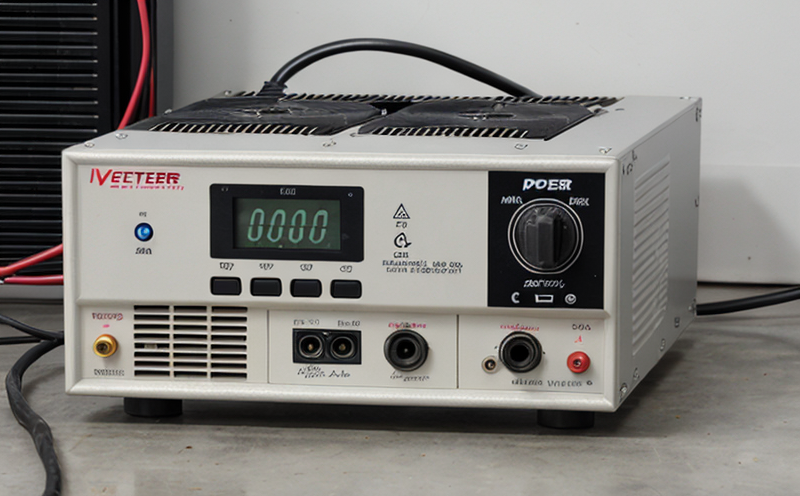UL 2202 Safety Testing of Inverter Charging Systems
The UL 2202 safety testing standard is a critical component in the certification process for inverters and power electronics used in renewable energy applications. This test ensures that the charging systems used with these devices are safe under various stress conditions, which can help prevent potential hazards like overheating or electrical faults.
The UL 2202 testing protocol is designed to simulate real-world operating conditions that inverters may encounter during their lifecycle. This includes exposure to high and low temperatures, humidity, dust, and other environmental factors that could impact the performance of charging systems. By subjecting these components to such rigorous tests, manufacturers can ensure they meet stringent safety requirements set forth by Underwriters Laboratories (UL).
The test involves a series of procedures intended to evaluate the electrical integrity of inverter circuits as well as the overall structural integrity of the equipment when subjected to specific environmental stresses. For instance, during the high-temperature cycling tests, specimens are exposed to temperatures ranging from -40°C up to 85°C for extended periods, followed by rapid cooling back down again.
Another key aspect of UL 2202 testing is its focus on electrical insulation performance. This ensures that there will be no degradation in the insulating properties over time which could lead to shorts or other issues within the circuitry. Insulation resistance tests are conducted at different voltage levels to assess how well each component holds up against moisture ingress and mechanical stress.
The UL 2202 standard also places emphasis on ensuring adequate protection mechanisms are in place for overcurrent, overvoltage, short circuit conditions, among others. These protective features must activate correctly when needed without false triggering under normal operating conditions. By verifying these protections through rigorous testing protocols, the integrity of the entire system is maintained.
Given that renewable energy sources such as solar photovoltaic (PV) systems are increasingly being deployed across various geographical regions with diverse climates and operational requirements, it’s essential to have robust quality assurance measures in place. The UL 2202 test provides reassurance about the safety and reliability of inverter charging systems, thereby promoting trust among consumers who rely on these technologies for their daily power needs.
For instance, in regions where extreme weather events are common, knowing that your inverters meet rigorous standards like those specified by UL 2202 can provide peace of mind regarding the longevity and safety of your installation. Additionally, compliance with this standard can help streamline regulatory approvals and reduce the risk of product recalls or liability claims.
In summary, the UL 2202 safety testing of inverter charging systems plays an integral role in safeguarding both people and property by ensuring that critical components used in renewable energy installations are built to withstand harsh environmental conditions while maintaining high levels of electrical integrity. This ensures that consumers can continue relying on safe, efficient power generation solutions.
Scope and Methodology
| Test Parameter | Description |
|---|---|
| High-Temperature Cycling | Subjecting specimens to temperatures ranging from -40°C up to 85°C for extended periods, followed by rapid cooling. |
| Insulation Resistance Testing | Evaluating the ability of insulation materials to resist electrical breakdown under specified voltage levels. |
| Overcurrent Protection | Verifying that protective mechanisms activate correctly without false triggering during high current events. |
| Overvoltage Protection | Assessing the performance of overvoltage protection circuits under specified conditions to ensure they function as intended. |
Why Choose This Test
- Promotes safety by ensuring that inverter charging systems meet rigorous electrical integrity and insulation resistance requirements.
- Ensures compliance with international standards, enhancing the credibility of your product on global markets.
- Reduces the risk of product recalls or liability claims due to potential hazards associated with non-compliant products.
Competitive Advantage and Market Impact
- Enhances brand reputation by demonstrating a commitment to quality and safety in product design and manufacturing processes.
- Fosters customer confidence, leading to increased market share as consumers increasingly prioritize safer, more reliable energy solutions.
- Facilitates smoother regulatory approvals, reducing time-to-market for new products while minimizing the need for costly modifications later on.





